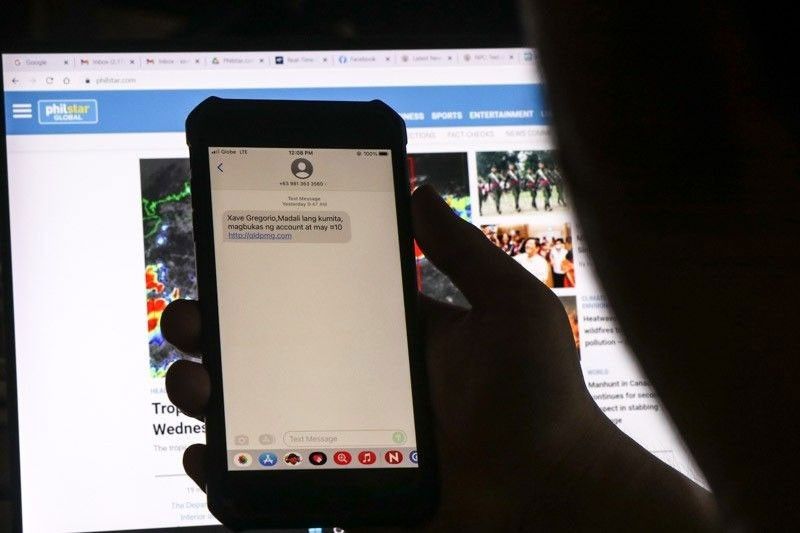Pinoys lost millions of dollars to text scams – government

MANILA, Philippines — The recent deluge of text scams has claimed millions of dollars from network subscribers in the Philippines who ended up clicking on malicious links and giving up sensitive information.
An official of the Cybercrime Investigation and Coordinating Center (CICC) yesterday confirmed that the government is near completing and releasing its probe on the source of text scams.
Initial findings disclosed by CICC deputy executive director Mary Rose Magsaysay revealed that the text scams stole millions of dollars from Filipinos who fell victim to their modus operandi.
Further, Magsaysay said the CICC investigation confirmed the findings of telco giant PLDT Inc. that the messaging scams with personalized details came from foreign sources. She added that local cohorts are hired by these foreign syndicates to assist them in the fraudulent activities.
“It is in the millions of dollars,” Magsaysay said, when sought how much was lost to text scams. “There are local, there are international, but most likely they are conniving and we need to raise our response.”
PLDT in September reported that the recent spate of text scams came from foreign groups that try to dupe Filipinos into compromising their sensitive information, especially bank details.
According to PLDT first vice president and chief information security officer Angel Redoble, the telco giant has carried out its own investigation on the text scams bugging its subscribers every day.
“It is highly possible that foreigners are behind the text scams that have plagued mobile users in the country,” Redoble said.
Further, Redoble said that domestic groups are working with these foreign criminals in acquiring SIM cards in bulk. Afterward, the SIMs are used in sending out the text scams that try to deceive Filipinos into clicking on malicious links that can hack into their personal database.
Ayala-led Globe Telecom Inc. responded by blocking text messages containing clickable links in a step to further prevent digital fraud. All messages from prepaid and postpaid numbers that carry a uniform resource locator will no longer be allowed to pass through Globe’s network.
On the other hand, PLDT’s wireless unit Smart Communications Inc. took an opposite route on the issue, blocking only website links that lead to malicious sites.
Magsaysay said CICC is poised to release its findings by the second half of October, afterward it plans to pursue a criminal case against the individuals behind the text scams.
Meanwhile, the proposed mandatory SIM card registration bill that Congress – the Senate and the House of Representatives – ratified last week, House Bill 14 and Senate Bill 1310 (SIM Registration Act), may well be President Marcos’ first law as Chief Executive.
“This (SIM card bill) may be the first of the many legislative measures that will be signed and enacted into law by President Marcos Jr. in his six years of office,” said House Speaker Martin Romualdez.
“Once enacted into law, this will be our first line of defense against scammers, con artists and criminal elements who use cellphone and other electronic communication gadgets for nefarious activities,” he warned.
HB 14, whose co-authors include Romualdez’s wife Yedda of party-list Tingog, her colleague Rep. Jude Acidre and Rep. Sandro Marcos of Ilocos Norte, is the first legislative measure that successfully passed the approval of the bicam of the 19th Congress.
Romualdez, who presided over last week’s session where the P5.268-trillion national budget for 2023 was approved, said the “Subscriber Identity Module (SIM) Registration Act” that he authored may be the first law that will be signed by his cousin Marcos.
The Speaker said the approval of the measure is timely amid the continuing proliferation of malicious text messages meant to take advantage of unwary cell phone users and could even pose danger to people’s lives and to public order.
“This Act will not only help promote responsibility in the end users of SIMs for electronic devices but also provide our law enforcers the necessary tools to resolve crimes involving telecommunication devices,” Romualdez said. – Delon Porcalla
- Latest
- Trending



























